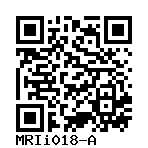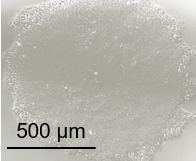HLHS_375
MRIi018-A
General
Cell Line |
|
| hPSCreg name | MRIi018-A |
| Cite as: | MRIi018-A (RRID:CVCL_A8MP) |
| Alternative name(s) |
HLHS_375
|
| Cell line type | Human induced pluripotent stem cell (hiPSC) |
| Similar lines |
|
| Last update | 20th April 2022 |
| User feedback | |
Provider |
|
| Generator |
Klinikum rechts der Isar (MRI)
Contact:
Klinikum rechts der Isar (MRI) |
| Derivation country | Germany |
External Databases |
|
| BioSamples | SAMEA8944460 |
| Cellosaurus | CVCL_A8MP |
| Wikidata | Q108820967 |
General Information |
|
| Publications | |
| * Is the cell line readily obtainable for third parties? |
No |
Donor Information
General Donor Information |
|
| Sex | male |
| Ethnicity | Caucasian |
Phenotype and Disease related information (Donor) |
|
| Diseases | A disease was diagnosed.
|
| Disease associated phenotypes |
|
| Family history | No abnormalities have been described regarding the family history. |
| Is the medical history available upon request? | Clinical information is available upon request. |
| Is clinical information available? | Clinical information is available upon request. |
Karyotyping (Donor) |
|
| Has the donor karyotype been analysed? |
No
|
Other Genotyping (Donor) |
|
| Is there genome-wide genotyping or functional data available? |
Yes
Exome sequencing
Three de novo mutations found. BAI2: c.800G>A; DENND5B: c.2396A>G; SYBU: c.278C>A. |
External Databases (Donor) |
|
| BioSamples | SAMEA8944459 |
Ethics
| Has informed consent been obtained from the donor of the embryo/tissue from which the pluripotent stem cells have been derived? | Yes |
| Was the consent voluntarily given? | Yes |
| Has the donor been informed that participation will not directly influence their personal treatment? | Yes |
| Can you provide us with a copy of the Donor Information Sheet provided to the donor? | Yes |
| Do you (Depositor/Provider) hold the original Donor Consent Form? | Yes |
| Alternatives to consent are available? | No |
| Is there other documentation provided to the donor for consenting purposes? | No |
| Confirm that consent was obtained by a qualified professional | Yes |
| Has the donor agreed to be re-contacted? | Unknown |
| Has the donor been informed about how her/his data will be protected? | Yes |
| Please indicate whether the data associated with the donated material has been pseudonymised or anonymised. | pseudonymised |
| Does consent explicitly allow the derivation of pluripotent stem cells? | Yes |
| * Does consent expressly prevent the derivation of pluripotent stem cells? | No |
| * Does consent pertain to a specific research project? | Yes |
| Details on restriction to research project | |
| Does consent permit unforeseen future research, without further consent? | No |
| Does the consent permit uses of donated embryo/tissue or derived cell line intended for clinical treatment or human applications? | No |
| Does consent expressly prevent development of commercial products? | No |
| Does consent expressly prevent financial gain from any use of the donated embryo/tissue, including any product made from it? | No |
| Does consent expressly permit storage of donated embryo/tissue for an unlimited time? | No |
| Does consent expressly permit storage of cells derived from the donated embryo/tissue for an unlimited time? | No |
| Does consent prevent the DONATED BIOSAMPLE from being made available to researchers anywhere in the world? | No |
| Does consent prevent CELLS DERIVED FROM THE DONATED BIOSAMPLE from being made available to researchers anywhere in the world? | No |
Does consent permit research by | |
| an academic institution? | No |
| a public organisation? | No |
| a non-profit company? | No |
| a for-profit corporation? | No |
| Does consent expressly permit collection of genetic information? | No |
| Does consent expressly permit storage of genetic information? | No |
| Does consent prevent dissemination of genetic information? | No |
| Has the donor been informed that their donated biosample or derived cells may be tested for the presence of microbiological agents / pathogens? | No |
| Has the donor consented to receive information discovered during use of donated embryo/tissue that has significant health implications for the donor? | No |
| How may genetic information associated with the cell line be accessed? | No information |
| Will the donor expect to receive financial benefit, beyond reasonable expenses, in return for donating the biosample? | No |
| Does the consent anticipate that the donor will be notified of results or outcomes of any research involving the donated samples or derived cells? | No |
| Does the consent permit the donor, upon withdrawal of consent, to stop the use of the derived cell line(s) that have already been created from donated samples? | Yes |
| Does the consent permit the donor, upon withdrawal of consent, to stop delivery or use of information and data about the donor? | Yes |
| Does consent permit access to medical records of the donor? | Yes |
| Please describe how access is provided: | German Heart Center Munich, Department of Cardiovascular Surgery, Institute Insure |
| Does consent permit access to any other source of information about the clinical treatment or health of the donor? | Yes |
| Contact data, institution, or website: | German Heart Center Munich, Department of Cardiovascular Surgery, Institute Insure |
| Has a favourable opinion been obtained from a research ethics committee, or other ethics review panel, in relation to the Research Protocol including the consent provisions? | Yes |
| Name of accrediting authority involved? | German Heart Center Munich, Department of Cardiovascular Surgery, Institute Insure |
| Approval number | 5943/13, 2919/10 |
| Has a favourable opinion been obtained from a research ethics committee, or other ethics review panel, in relation to the PROPOSED PROJECT, involving use of donated embryo/tissue or derived cells? | Yes |
| Name of accrediting authority involved? | German Heart Center Munich, Department of Cardiovascular Surgery, Institute Insure |
| Approval number | 5943/13, 2919/10 |
| Do you have obligations to third parties in regard to the use of the cell line? | No |
| Are you aware of any further constraints on the use of the donated embryo/tissue or derived cells? | No |
| Is there an MTA available for the cell line? | No |
| For generation of the cell line, who was the supplier of any recombined DNA vectors or commercial kits used? | Thermofisher |
| Are you aware of any constraints on the use or distribution of the cell line from the owner or any parties identified in the query above? | No |
hIPSC Derivation
General |
|
| Source cell type | |
Reprogramming method |
|
| Vector type | Non-integrating |
| Vector | Sendai virus |
| Is reprogramming vector detectable? |
Yes |
| Methods used |
RT-PCR
|
| Files and images showing reprogramming vector expressed or silenced | |
Vector free reprogramming |
|
Other |
|
| Derived under xeno-free conditions |
Unknown |
| Derived under GMP? |
No |
| Available as clinical grade? |
No |
Culture Conditions
| Surface coating | Matrigel/Geltrex |
| Feeder cells |
No |
| Passage method |
Enzyme-free cell dissociation
EDTA
|
| CO2 Concentration | 5 % |
| Medium |
Essential 8™
|
| Has Rock inhibitor (Y27632) been used at passage previously with this cell line? | Yes |
| Has Rock inhibitor (Y27632) been used at cryo previously with this cell line? | Yes |
| Has Rock inhibitor (Y27632) been used at thaw previously with this cell line? | Yes |
Characterisation
Analysis of Undifferentiated Cells
| Marker | Expressed | Immunostaining | RT-PCR | Flow Cytometry | Enzymatic Assay | Expression Profiles |
| TRA 1-81 |
Yes |
|||||
| SOX2 |
Yes |
|||||
| NANOG |
Yes |
|||||
| KLF4 – Kruppel like factor 4 |
Yes |
|||||
| REX1 - RNA exonuclease 1 homolog |
Yes |
|||||
| OCT4 - POU class 5 homeobox 1 |
Yes |
|||||
| c-MYC - MYC proto-oncogene, bHLH transcription factor |
Yes |
Score:
| Marker | Present | Absent |
| mCpG | ||
| OCT4 |
Differentiation Potency
In vitro spontaneous differentiation
| Marker | Expressed |
| alpha fetoprotein |
Yes |
| SOX7 SRY-box transcription factor 7 |
Yes |
Protocol or reference
AFP_expression.png
Quantitative RT-PCR for the AFP gene expression representative of the endoderm germ layer upon spontaneous embryoid-body differentiation (D21 vs D0).
SOX7_expression.png
Quantitative RT-PCR for the SOX7 gene expression representative of the endoderm germ layer upon spontaneous embryoid-body differentiation (D21 vs D0).
In vitro spontaneous differentiation
| Marker | Expressed |
| ACTA2 – actin alpha 2, smooth muscle |
Yes |
| PECAM1 platelet and endothelial cell adhesion molecule 1 |
Yes |
Protocol or reference
ACTA2_expression.png
Quantitative RT-PCR for the ACTA2 gene expression representative of the mesoderm germ layer upon spontaneous embryoid-body differentiation (D21 vs D0).
CD31_expression.png
Quantitative RT-PCR for the CD31 (PECAM) gene expression representative of the mesoderm germ layer upon spontaneous embryoid-body differentiation (D21 vs D0).
In vitro spontaneous differentiation
| Marker | Expressed |
| KRT14 keratin 14 |
Yes |
| TH tyrosine hydroxylase |
Yes |
Protocol or reference
KRT14_expression.png
Quantitative RT-PCR for the KTR14 gene expression representative of the ectoderm germ layer upon spontaneous embryoid-body differentiation (D21 vs D0).
TH_expression.png
Quantitative RT-PCR for the TH gene expression representative of the ectoderm germ layer upon spontaneous embryoid-body differentiation (D21 vs D0).
Microbiology / Virus Screening |
|
| HIV 1 | Negative |
| Hepatitis B | Negative |
| Hepatitis C | Negative |
| Mycoplasma | Negative |
Genotyping
Karyotyping (Cell Line) |
|
| Has the cell line karyotype been analysed? |
Yes
Normal
|
Other Genotyping (Cell Line) |
|



Login to share your feedback, experiences or results with the research community.